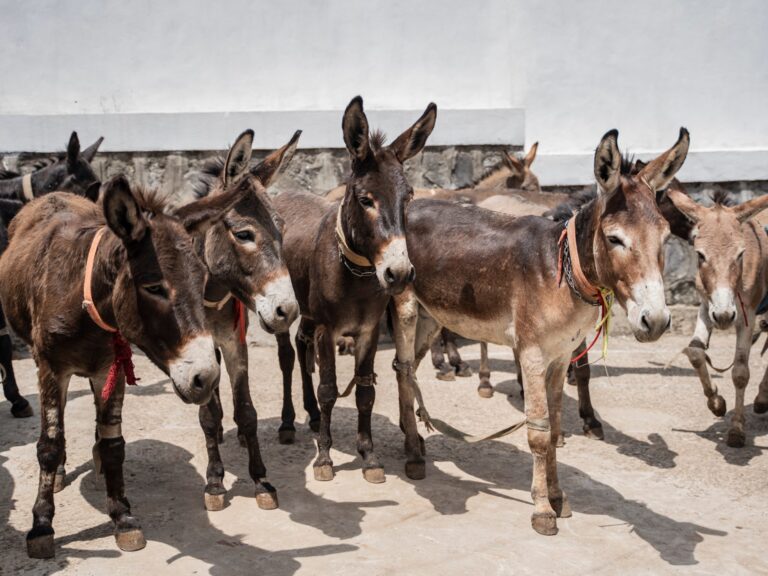Ethiopia is believed to host the world’s largest population of donkeys – one in five of the global total, according to the United Nations.
The humble donkey is a cornerstone of the national economy, and the Donkey Sanctuary – a free clinic run by a British charity – is crucial in Addis Ababa. Set near Merkato, the city’s sprawling open-air market, it provides care for animals that are often indispensable to their owners’ livelihoods.
Several dozen donkeys stand in enclosures at the clinic – some agitatedly kicking their legs, others hungrily tucking into their food. Caregivers and veterinarians move from animal to animal, treating a range of ailments including injuries, colic and eye conditions.
Among them is Guluma Bayi, 38, who had walked more than an hour and a half, leading his two donkeys to the clinic.
“It has been three weeks since my donkeys became sick,” said Guluma. “One has a leg problem and the other has a stomach issue.”
Like many, Guluma depends on his donkeys for his livelihood, using them to transport jerrycans of water for sale in his community.
“After they became ill, I couldn’t buy bread for my children,” he said. “I begged a guy to bring me here.”
According to the UN Food and Agriculture Organization, Ethiopia was home to some nine million donkeys as of 2018. In this East African nation of approximately 130 million people, donkeys play a chief economic role, ploughing fields and transporting goods – offering a low-cost alternative to vehicles at a time when the price of fuel has soared.
Another regular visitor, Chane Baye, earns his living by using his two donkeys to transport sacks of grain across the city for clients. His income can range from 200 to 400 birr per day (approximately $1.50 to $3) – a decent sum in a country where a third of the population lives below the World Bank’s poverty line of $2.15 a day.
The 61-year-old seeks out the clinic every three months or so – “whenever they start limping or have a stomach problem”, he said.
“Before this clinic, we used traditional ways to treat them,” he explained, describing how nails were once crudely removed from the animals’ legs with a knife. He is grateful that his donkeys now have access to professional care for their injuries and infections.
At the clinic, vet Derege Tsegay demonstrates the less glamorous side of his work by performing a routine but unpleasant procedure – reaching deep into a distressed donkey’s rectum, clad in a rubber glove.
Derege removes a large mass of stool that had accumulated in the animal’s digestive tract.
“It happens often,” he remarked.
A lack of adequate food in the city frequently leads donkeys to ingest whatever they find – including plastic bags – which can wreak havoc on their digestive health.
Though the work is often challenging, Derege takes pride in what he does.
“I am proud of what I am doing … because I am trying to solve the problem of so many owners that rely on their donkeys,” he said with a smile.

